Flaxseeds are small but mighty seeds packed with nutrients that can significantly benefit your health. They are rich in omega-3 fatty acids, fiber, and antioxidants, which contribute to better heart health, lower cholesterol, and improved blood sugar levels. Including flaxseeds in your diet can also aid in weight management and support digestive health.

Beyond their nutritional profile, flaxseeds have been linked to reducing the risk of various chronic conditions like heart disease, diabetes, and even certain cancers. They are a simple addition to many meals, whether whole, ground, or in oil form, making them a versatile ingredient in healthy eating.
Understanding how to incorporate flaxseeds into your daily routine is essential. From smoothies and salads to baked goods, there are countless ways to enjoy their benefits. Keep reading to learn more about the potential risks and how you can seamlessly add these powerful seeds to your diet.
Key Takeaways
- Flaxseeds provide essential nutrients like omega-3 fatty acids and fiber.
- They support heart health, blood sugar control, and weight management.
- Various forms of flaxseeds can be easily added to meals for maximum health benefits.
Nutritional Profile of Flaxseeds
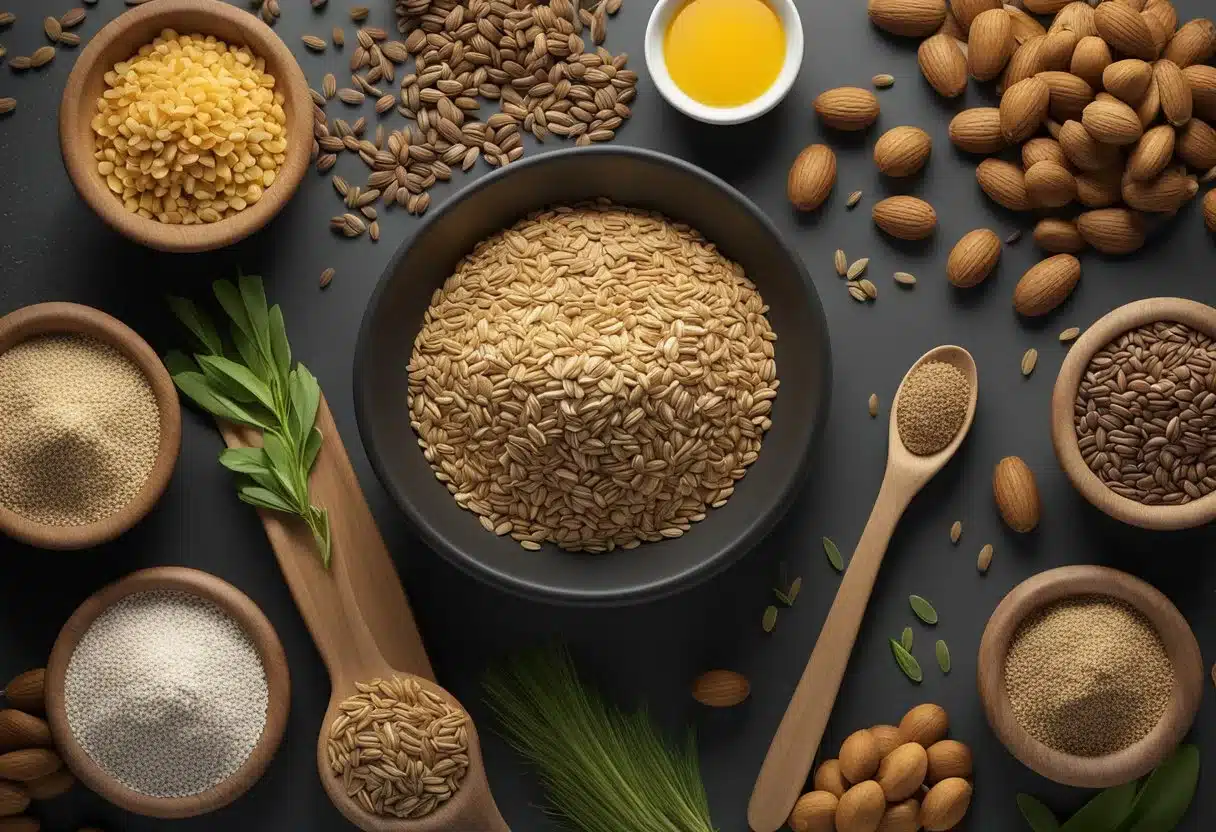
Flaxseeds are highly nutritious, providing a rich mix of essential macronutrients, vitamins, and minerals. Their impressive nutritional content makes them a valuable addition to a balanced diet.
Macronutrients and Calories
Flaxseeds contain 534 calories per 100 grams, translating to 55 calories per tablespoon. The primary macronutrients are fat, carbohydrates, and protein.
- Fat: Flaxseeds are composed of 42% fat, including 2 grams of polyunsaturated fat (with omega-3 fatty acids) and 0.5 grams of monounsaturated fat per tablespoon.
- Carbs: They consist of 29% carbs, of which a large portion is dietary fiber. This fiber is beneficial for digestive health.
- Protein: Flaxseeds provide 18% protein, making them a good plant-based protein source.
These seeds can be a powerful addition to a diet, contributing to daily macronutrient requirements efficiently.
Vitamins and Minerals
Flaxseeds are rich in various vitamins and minerals that support overall health.
- Thiamine (Vitamin B1): Important for converting nutrients into energy.
- Magnesium: Essential for muscle and nerve function, present in high quantities.
- Copper: Crucial for iron metabolism and forming connective tissue.
- Phosphorus: Supports bone health and energy production.
- Iron: Necessary for transporting oxygen in the blood.
- Zinc: Involved in immune function, protein synthesis, and DNA synthesis.
- Potassium: Helps with muscle contractions and nerve signals.
- Selenium: Provides antioxidant benefits.
By including flaxseeds in a diet, individuals can benefit from these nutrients, promoting overall well-being and potentially reducing the risk of nutrient deficiencies.
Health Benefits of Flaxseeds
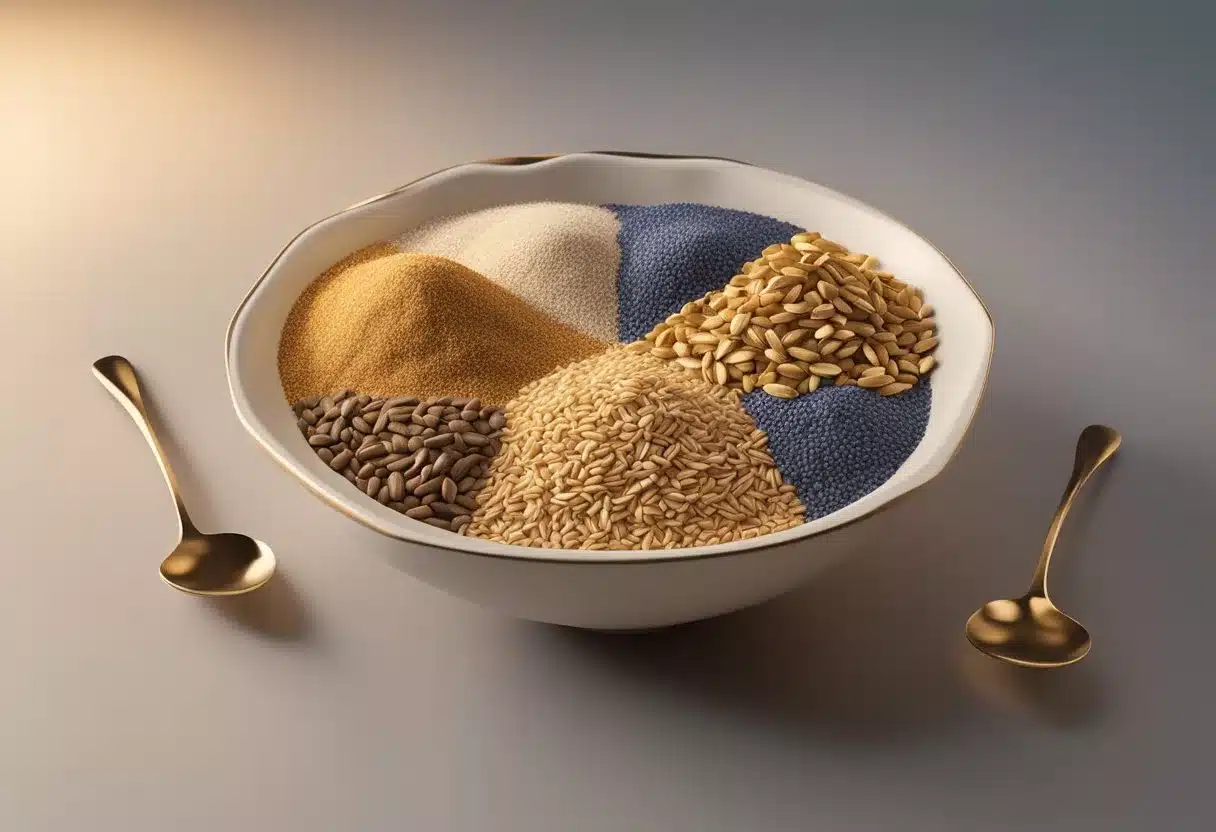
Flaxseeds offer a variety of health benefits, ranging from improved heart health to aiding in weight management. These nutrient-dense seeds are packed with omega-3 fatty acids, fiber, and antioxidants such as lignans, which can help with everything from reducing inflammation to improving digestion.
Cardiovascular Health
Flaxseeds are beneficial for heart health. They are high in omega-3 fatty acids, particularly alpha-linolenic acid (ALA), which can help reduce the risk of heart disease. Regular consumption of flaxseeds can contribute to lowering cholesterol levels and decreasing blood pressure.
Lignans in flaxseeds act as antioxidants, providing additional protection against cardiovascular diseases. Including flaxseeds in your diet may also reduce the risk of atherosclerosis by preventing the hardening and narrowing of the arteries.
Digestive Health
Flaxseeds are an excellent source of dietary fiber, aiding in digestive health. They promote regular bowel movements and help prevent constipation. Consuming flaxseeds can also support a healthy gut microbiome by feeding beneficial bacteria in the intestines.
The fiber content in flaxseeds adds bulk to the stool, which can help with digestive issues like irritable bowel syndrome (IBS). Fiber also slows down digestion and increases nutrient absorption, which can be beneficial for overall digestive health.
Cancer Prevention and Omega-3s
Lignans, a type of antioxidant in flaxseeds, have been linked to a lower risk of certain cancers, including breast and prostate cancer. These phytoestrogens can block the enzymes that are involved in hormone metabolism and hinder the growth and spread of tumor cells.
Omega-3 fatty acids in flaxseeds further contribute to cancer prevention by reducing inflammation and improving the immune response. Including flaxseeds in your diet can be a natural way to boost defense against various cancers.
Weight Management
Flaxseeds can aid in weight management due to their high fiber content. Fiber helps you feel full longer, which can reduce overeating and snacking between meals. This satiety can assist with weight loss efforts and improve metabolic health.
In addition, flaxseeds contain protein, which also contributes to a sense of fullness. Combining both fiber and protein makes flaxseeds ideal for those looking to manage their weight or achieve weight loss goals.
Anti-Inflammatory Properties
Flaxseeds have significant anti-inflammatory properties, largely due to the presence of omega-3 fatty acids like ALA. These fatty acids can help reduce inflammation in the body, which is beneficial for people with chronic inflammatory conditions such as arthritis.
The antioxidants in flaxseeds, including lignans, further support reducing inflammation. This can be beneficial for heart health, joint pain relief, and reduce overall inflammation in the body.
Diabetes Control
Flaxseeds can help control blood sugar levels, making them beneficial for people with diabetes. The high fiber content slows the absorption of sugar into the bloodstream, preventing spikes in blood sugar levels. This can be particularly helpful for managing type 2 diabetes.
Consuming flaxseeds has also been shown to improve insulin sensitivity. This means that the body can use insulin more effectively, which is crucial for maintaining stable blood sugar levels and preventing diabetic complications.
Incorporating Flaxseeds into Your Diet
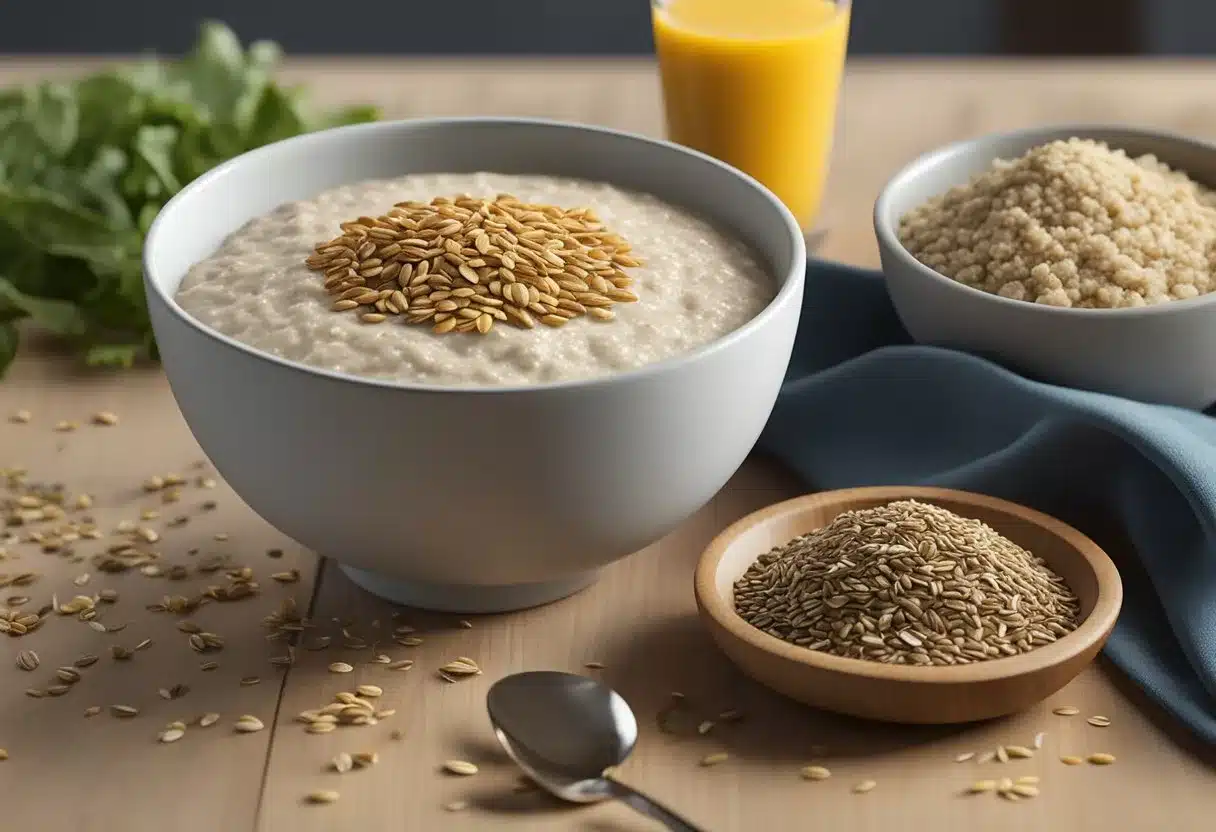
Flaxseeds can easily be added to your diet in various ways. They can be used as an ingredient in cooking and baking or included in meals and snacks for extra health benefits.
Using Flaxseed as an Ingredient
Adding flaxseed to everyday recipes is a simple way to boost nutrition. Ground flaxseed can be mixed into pancake batter, muffins, or other baked goods like cookies and breads. It can also be stirred into yogurt or oatmeal, creating a nutrient-packed breakfast.
Including ground flaxseed in smoothies is another convenient option, providing added fiber and omega-3 fatty acids. Whole flaxseeds can also be used, but they may pass through the digestive system without being fully absorbed. It’s often best to use ground flaxseeds for recipes to ensure maximum nutrient intake.
For those who enjoy making homemade salad dressings, adding a teaspoon of flaxseed oil can enhance the flavor and health benefits. The versatility of flaxseed makes it easy to incorporate into many aspects of cooking and baking.
Flaxseeds in Meals & Snacks
Flaxseeds can enhance a variety of meals and snacks. Adding a tablespoon of ground flaxseed to breakfast cereal or mixing it into smoothie bowls can provide a great start to the day. Flaxseed can also be sprinkled on salads for a crunchy texture and added nutrients.
For snacks, consider incorporating flaxseed into energy bars or bliss balls. Mixing ground flaxseed into the dough of homemade cakes and muffins not only adds nutrition but also helps bind the ingredients.
Ground flaxseed can also be incorporated into salad dressing. Simply mix it with mustard or mayonnaise when making a sandwich. This small addition can significantly boost the fiber and omega-3 content of meals.
By experimenting with flaxseed in various dishes, one can enjoy its health benefits in a variety of tasty ways.
Different Forms of Flaxseeds
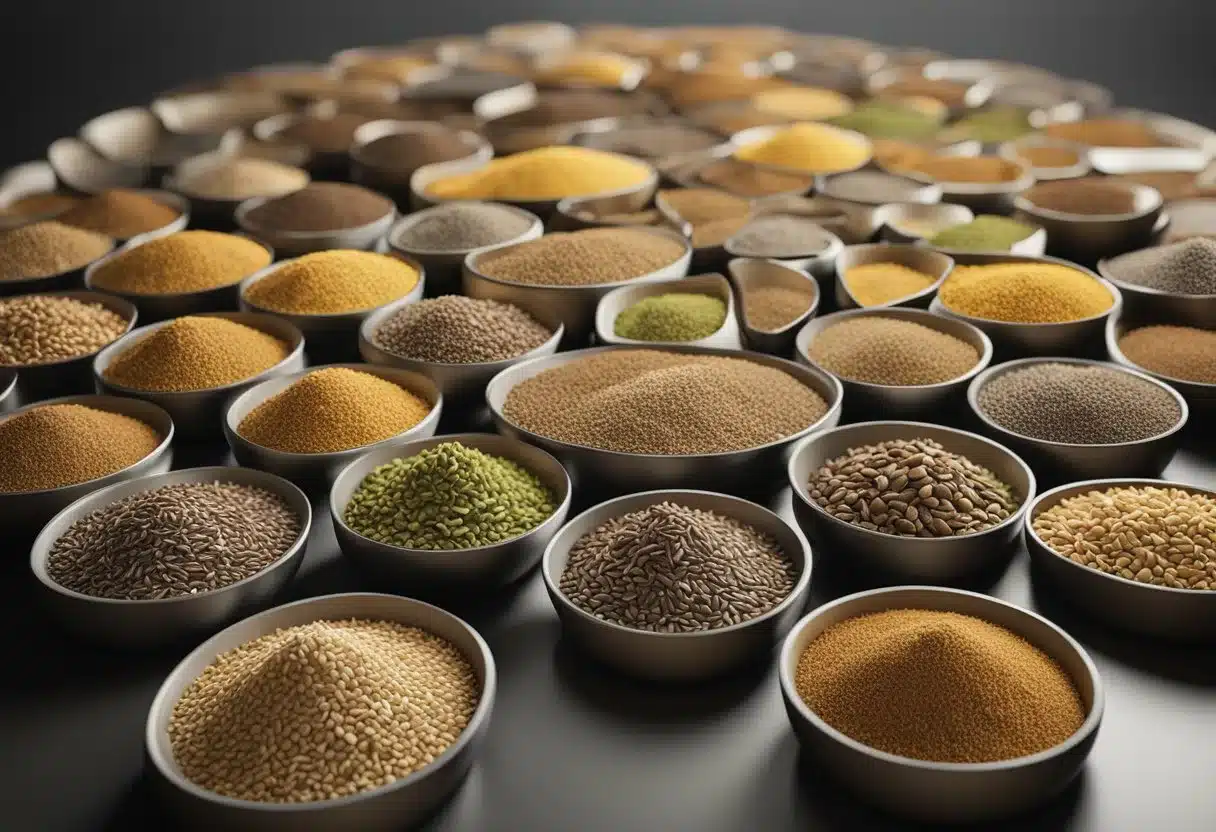
Flaxseeds come in different forms, each with unique benefits and uses. These forms include whole flaxseeds, ground flaxseeds, and flaxseed oil.
Whole vs. Ground Flaxseeds
Whole flaxseeds are often used in baking or as a topping for dishes. However, the body cannot easily digest whole seeds, so their nutrients might not be fully absorbed. These seeds are rich in soluble and insoluble fiber, helping with digestion and promoting a feeling of fullness.
On the other hand, ground flaxseeds are easier for the body to absorb. Grinding the seeds releases their nutrients, such as plant compounds and essential fatty acids. Ground flaxseeds have a nutty flavor and can be easily added to smoothies, oatmeal, or yogurt.
Flaxseed Oil
Flaxseed oil is another popular form of flaxseed. It is extracted from the seeds and is a good source of polyunsaturated fat, especially omega-3 fatty acids. The oil does not contain the fiber found in whole or ground seeds but provides the essential fatty acids.
Flaxseed oil is often used as a salad dressing or added to smoothies. It should not be used for cooking at high temperatures, as heat can destroy its beneficial properties. Flaxseed oil is an easy way to get the benefits of flaxseeds without consuming the seeds themselves.
Flaxseed oil has a distinct taste, which some might find strong. However, its high content of polyunsaturated fats makes it a valuable addition to a balanced diet.
Potential Side Effects and Considerations
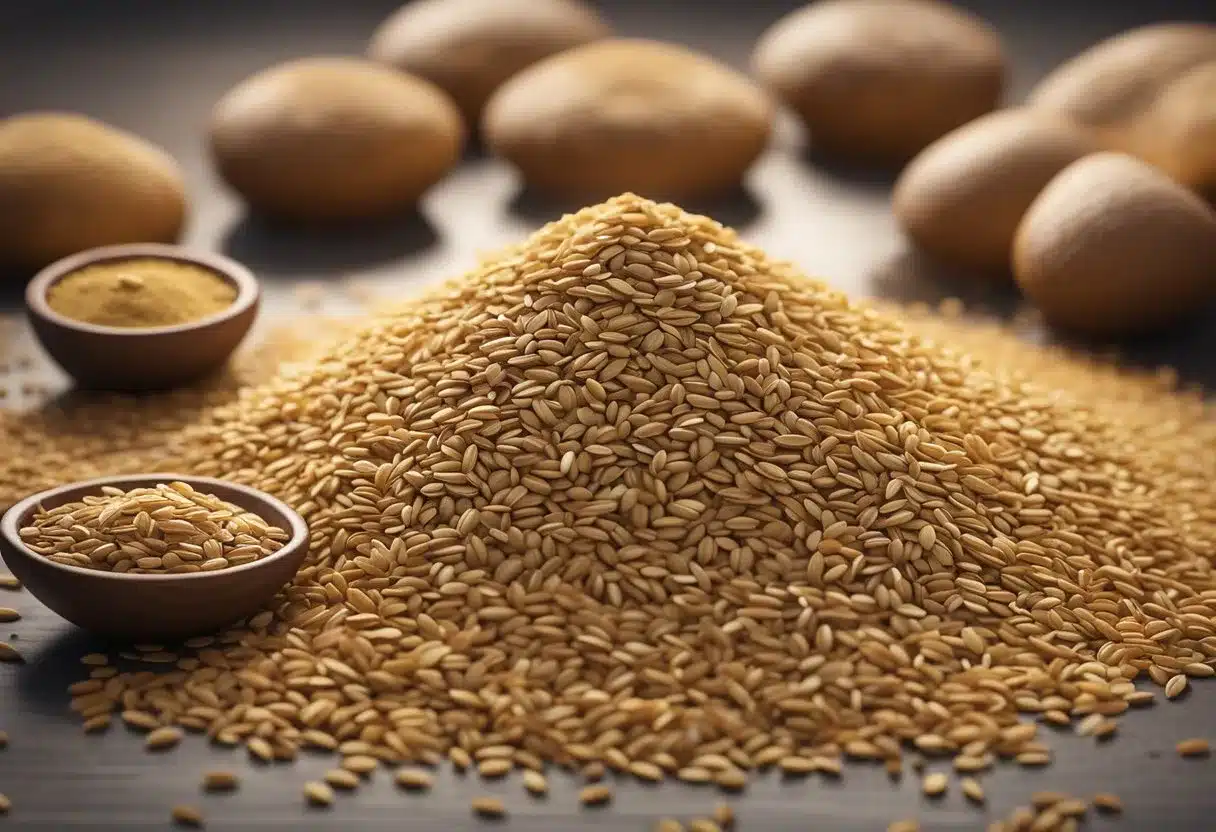
While flaxseeds are packed with nutrients and health benefits, they can also cause some side effects, especially when consumed in large quantities. Key considerations include digestive effects and potential allergic reactions.
Digestive Effects
Flaxseeds are high in fiber, which can impact digestion and bowel movements. Specifically, they may help with constipation due to their ability to add bulk to stool, promoting regularity. However, consuming too much fiber can lead to bloating and gas, making digestive health uncomfortable for some people.
To avoid these issues, it is recommended to introduce flaxseeds slowly into the diet and drink plenty of water. This can help the digestive system adjust to the increased fiber intake and reduce the chances of experiencing severe bloating or gas.
Allergic Reactions
Though rare, some people may experience allergic reactions to flaxseeds. Symptoms can include itching, swelling, or rashes on the skin. In more severe cases, symptoms might include difficulty breathing, which requires immediate medical attention.
It is important to be aware of any adverse reactions after consuming flaxseeds for the first time. Those with known allergies to similar seeds or nuts should be particularly cautious. Always consult with a healthcare provider if unsure about potential allergic responses.
The Historical and Cultural Significance of Flax

Flax has played a significant role in human history, serving as an essential crop for both its fiber and nutritious seeds. From ancient civilizations to modern times, the flax plant has remained valuable for its various uses.
Flax in Ancient Cultures
In ancient Egypt, flax was cultivated extensively for making linen, a valuable textile. Linen garments were highly prized, and the cloth was often used in burial shrouds for mummies. The Egyptians admired the plant’s fine fibers and its ability to produce high-quality fabric.
The ancient Greeks and Romans also appreciated flaxseeds and linum usitatissimum. They used flax to produce ropes, sails, and clothing. Hippocrates, known as the “Father of Medicine,” prescribed flaxseeds for digestive health, highlighting its importance in ancient medical practices.
In China, flax was grown for both its fiber and seeds. Archaeological evidence suggests that flax cultivation dates back over 5,000 years in this region. It was a crucial crop, used in traditional Chinese medicine and textile production.
Contemporary Use and Perception
Today, flax and linum usitatissimum continue to be important. The seeds are consumed for their high concentration of omega-3 fatty acids, lignans, and fiber. Modern dietary trends have classified flaxseeds as a “superfood” due to their numerous health benefits, including support for heart health and digestion.
Flaxseed oil is another popular product, used in cooking and as a dietary supplement. Its high omega-3 content makes it a sought-after ingredient in healthy diets. Additionally, flaxseed meal is used in baking and as a protein supplement in smoothies.
In the textile industry, flax fiber is still valued for its strength and durability. Linen made from flax remains a premium fabric, known for its breathability and natural texture. The versatile uses of flax make it a staple in both traditional and contemporary settings.
Frequently Asked Questions
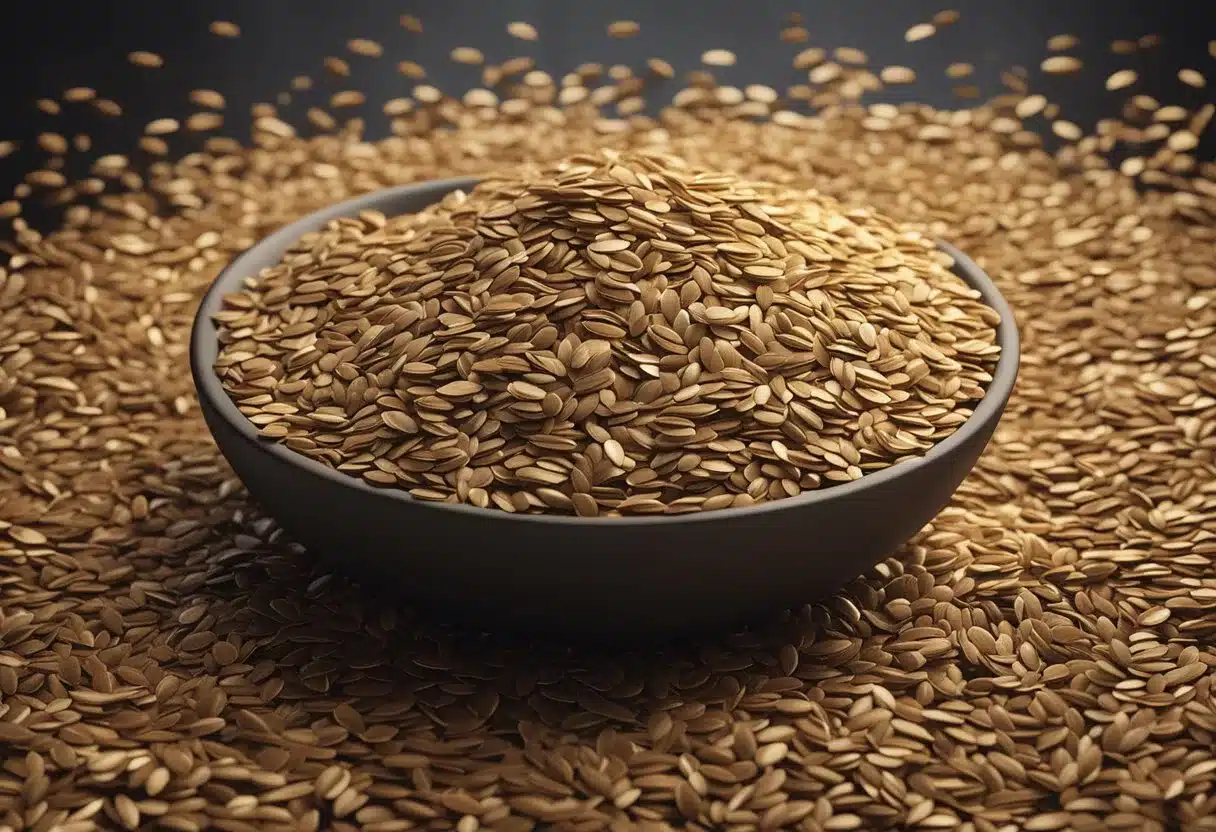
Flaxseeds provide numerous health benefits and can be added to various meals, benefiting both men and women. They also contribute to healthier skin and hair.
What are the health advantages of consuming flaxseeds for women?
Flaxseeds may help reduce the risk of breast cancer due to their high levels of lignans. They can also help regulate menstrual cycles and alleviate symptoms of menopause. Additionally, the omega-3 fatty acids in flaxseeds can reduce inflammation and support heart health.
Can you explain the best ways to incorporate flaxseeds into one’s diet?
Flaxseeds can be added to smoothies, yogurt, oatmeal, and baked goods. Ground flaxseeds are easier to digest and absorb than whole seeds. You can also sprinkle them on salads or add them to soups and stews for a nutritional boost.
What are the specific health benefits of flaxseeds for men?
For men, flaxseeds may help improve prostate health. They are also known to support heart health by lowering cholesterol levels and reducing blood pressure. The omega-3 fatty acids found in flaxseeds can further support brain function and reduce inflammation.
How do flaxseeds contribute to healthier skin?
Flaxseeds are rich in alpha-linolenic acid (ALA), which helps keep the skin hydrated and supple. The antioxidants in flaxseeds can reduce skin inflammation and protect against sun damage. Regular consumption can also promote smoother skin by maintaining its natural moisture balance.
What is the recommended daily intake of flaxseeds?
The recommended daily intake of flaxseeds is about 1-2 tablespoons. This provides a good balance of fiber, protein, and omega-3 fatty acids. It’s important to start with a small amount and gradually increase to avoid digestive discomfort.
In what ways can flaxseeds positively impact hair health?
Flaxseeds contain essential nutrients like vitamin E, magnesium, and omega-3 fatty acids that promote hair growth. These nutrients help improve circulation in the scalp and keep hair follicles healthy. Regular consumption can also prevent dryness and reduce hair breakage.